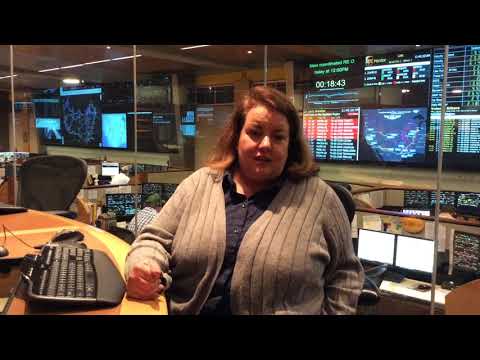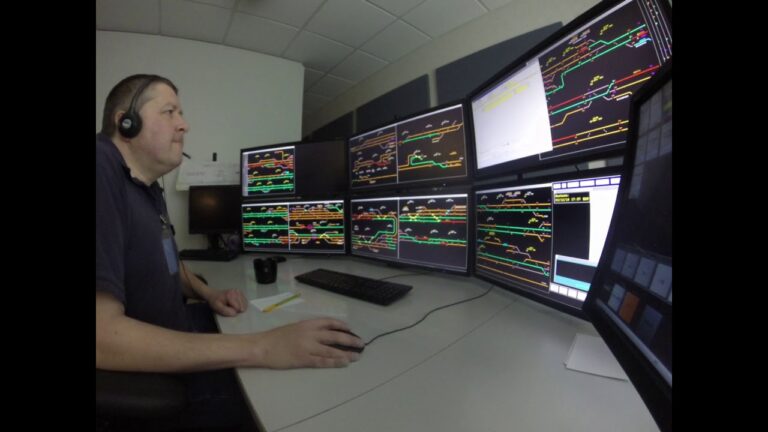Train Dispatching: Job Description & Salary
Train Dispatching Job Description involves managing and coordinating the movement of trains within a rail network. Dispatchers are responsible for ensuring the safe and efficient operation of train services. They communicate with train crews, signal operators, and other staff to schedule and regulate train movements.
A Train Dispatcher must have excellent organizational and multitasking skills. They must be able to make quick decisions, prioritize tasks, and handle emergencies effectively. Dispatchers use computerized systems to monitor train positions, track train movements, and update schedules in real-time. They also communicate important information to train crews, such as track conditions, speed restrictions, and any operational changes.
A Train Dispatcher works in a fast-paced, high-pressure environment, often in a control center. They must remain calm and composed while handling multiple tasks simultaneously. They must have a thorough understanding of railway operations, safety regulations, and train signaling systems.
As for the salary, a Train Dispatcher can expect to earn a competitive wage. According to industry reports, the average salary for Train Dispatchers ranges between $50,000 and $70,000 per year, depending on experience and location. Some companies may offer additional benefits, such as health insurance, retirement plans, and paid time off.
In conclusion, a Train Dispatching Job Description entails managing train movements and ensuring their safe operation. Dispatchers play a crucial role in maintaining efficient and reliable train services. The salary for this position can be quite rewarding, making it an attractive career choice for those interested in the transportation industry.

Train Dispatching Job Description Template
Train Dispatching Job Description
Train dispatching is a critical role in the efficient and safe operation of railway systems. As a train dispatcher, your primary responsibility is to ensure the smooth flow of train traffic by coordinating and managing the movement of trains on designated routes. This role requires a strong understanding of railway operations and a keen ability to make quick decisions under pressure.
One of the key responsibilities of a train dispatcher is to monitor train movements and maintain communication with train crews, station personnel, and other dispatchers. You will use various communication tools, such as radios and computer systems, to relay important information and instructions to train crews. Effective communication skills are vital in this role to ensure accurate and timely information exchange.
Another important aspect of train dispatching is problem-solving. As a dispatcher, you must be able to identify and resolve issues that may arise during train operations, such as train delays, equipment malfunctions, or track obstructions. You will need to think critically and act decisively to minimize disruptions and keep train traffic moving smoothly.
In addition to real-time monitoring and problem-solving, train dispatchers also play a crucial role in planning and scheduling train movements. This involves coordinating train departures and arrivals, assigning track space, and ensuring that trains adhere to established timetables. Attention to detail and strong organizational skills are essential in this aspect of the job.
Overall, the job of a train dispatcher requires a combination of technical knowledge, communication skills, and the ability to handle high-pressure situations. By effectively managing train traffic, train dispatchers contribute to the safe and efficient operation of railways, ensuring the transportation of goods and passengers reaches their destinations on time.
Train Dispatching Responsibilities
Train Dispatching Requirements
How Much Does A Train Dispatching Make?
Train Dispatching Salary
| Position | Salary Range |
|---|---|
| Train Dispatcher | $40,000 – $60,000 |
| Senior Train Dispatcher | $60,000 – $80,000 |
| Chief Train Dispatcher | $80,000 – $100,000 |
Train dispatching is a critical role in the transportation industry where professionals are responsible for coordinating and managing the movement of trains. The salary for train dispatching positions can vary based on factors such as experience, location, and level of responsibility.
A train dispatcher typically earns between $40,000 and $60,000 per year. As they gain more experience and take on additional responsibilities, they can advance to the position of a senior train dispatcher, which offers a salary range of $60,000 to $80,000. The highest level in this field is the chief train dispatcher, who can earn between $80,000 and $100,000 annually.
These salary ranges are just an approximation and can vary depending on various factors. It is important for individuals interested in pursuing a career in train dispatching to research the specific salary expectations in their desired location and industry.
Train Dispatching Salaries by Country
Top Paying Countries for Train Dispatching
| Country | Average Salary (USD) |
|---|---|
| United States | $70,250 |
| Canada | $65,000 |
| Australia | $62,000 |
| Germany | $55,000 |
| United Kingdom | $50,000 |
Train dispatching is a highly demanding job that requires exceptional organizational and communication skills. It involves managing the movement of trains, ensuring safety, and coordinating with various stakeholders. The salaries for train dispatching vary across different countries. According to available data, the United States offers the highest average salary for train dispatchers, followed by Canada and Australia. Germany and the United Kingdom also offer competitive salaries in this field. These figures reflect the importance and value placed on the crucial role of train dispatchers in maintaining efficient and safe railway operations.
A video on the topic Train Dispatching
Interview Questions for Train Dispatching
1. What is train dispatching?
Train dispatching refers to the process of coordinating and controlling the movement of trains on a railway network. It involves making decisions on train routes, schedules, and priorities to ensure safe and efficient operations.
2. What are the main responsibilities of a train dispatcher?
A train dispatcher is responsible for managing train movements, maintaining schedules, and ensuring the safety of trains and personnel. They communicate with train crews, signal operators, and other dispatchers to coordinate train movements and resolve any issues that may arise.
3. How does a train dispatcher communicate with train crews?
A train dispatcher typically communicates with train crews through a variety of means, including radio, telephone, or computer-based messaging systems. They provide updates on train orders, track conditions, and any changes to the train’s route or schedule.
4. What factors are considered when making dispatching decisions?
When making dispatching decisions, factors such as train priority, track availability, signal indications, and operational constraints are considered. Safety is always the top priority, followed by maintaining schedules and optimizing train movements to minimize delays.
5. How do train dispatchers handle emergencies or disruptions?
In the event of emergencies or disruptions, train dispatchers play a crucial role in managing the situation. They may reroute trains, communicate with emergency responders, coordinate repairs, and update affected personnel on the status of the incident.
6. What skills are required to be a successful train dispatcher?
Successful train dispatchers need excellent communication and problem-solving skills. They must be able to make quick decisions under pressure, have a strong attention to detail, and be able to multitask effectively. Knowledge of railway operations and safety regulations is also essential.
7. How do train dispatchers ensure the safety of trains?
Train dispatchers ensure the safety of trains by closely monitoring train movements, adhering to signal indications, and coordinating with other dispatchers and train crews. They follow established protocols and procedures to prevent accidents and respond promptly to any safety concerns.
8. How does technology impact train dispatching?
Technology has greatly improved train dispatching operations. Advanced computer systems and software tools enable dispatchers to have real-time visibility of train locations, track conditions, and schedules. This allows for more efficient decision-making and better coordination of train movements.
9. How do train dispatchers handle conflicting train routes?
When there are conflicting train routes, train dispatchers use their judgment and communication skills to coordinate with train crews and resolve the conflict. They may adjust train speeds, delay departures, or reroute trains to ensure safe passage and minimize disruptions.
10. What are the challenges faced by train dispatchers?
Train dispatchers face various challenges, including managing unexpected delays or disruptions, coordinating with multiple stakeholders, and ensuring compliance with safety regulations. They must also adapt to changing circumstances and make quick decisions to maintain smooth train operations.






